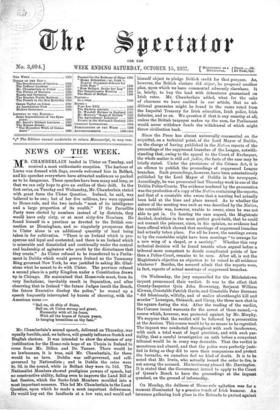Since the Press has almost universally commented on the acquittal,
on a technical point, of the Lord Mayor of Dublin, on the charge of having published in the Nation reports of the proceedings of the suppressed branches of the League, notwith- standing that, owing to the appeal to the Court of Exchequer, the whole matter is still sub judice, the facts of the case may be briefly stated. Under the provisions of the Crimes Act, it is an offence to publish the proceedings of suppressed League branches. Such proceedings, however, have been ostentatiously published by the Lord Mayor of Dublin in his newspaper. Accordingly, he was prosecuted last Thursday week in one of the Dublin Police-Courts. The evidence tendered by the prosecution was the production of a copy of the Nation containing the reports, and that of a constable who swore that a meeting had actually been held at the time and place named. As to whether the nature of the meeting was such as was described by the Nation, the constable was, however, unable to swear, since he was not able to get in. On hearing the case argued, the Magistrate decided, doubtless in the most perfect good-faith, that he could not commit the prisoner, since, in his opinion, no evidence had been offered which showed that meetings of suppressed branches had actually taken place. For all he knew, the meetings sworn to by the constables might have been meetings "to arrange for a new wing of a chapel, or a eacristy." Whether this very technical decision will be found tenable when argued before a tribunal more competent to decide complicated points of law than a Police-Court, remains to be seen. After all, is not the Magistrate's objection an objection to he raised to all evidence whatever ? Besides, the accused admit that the reports were, in fact, reports of actual meetings of suppressed branches.


































